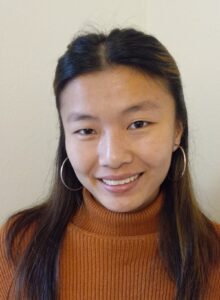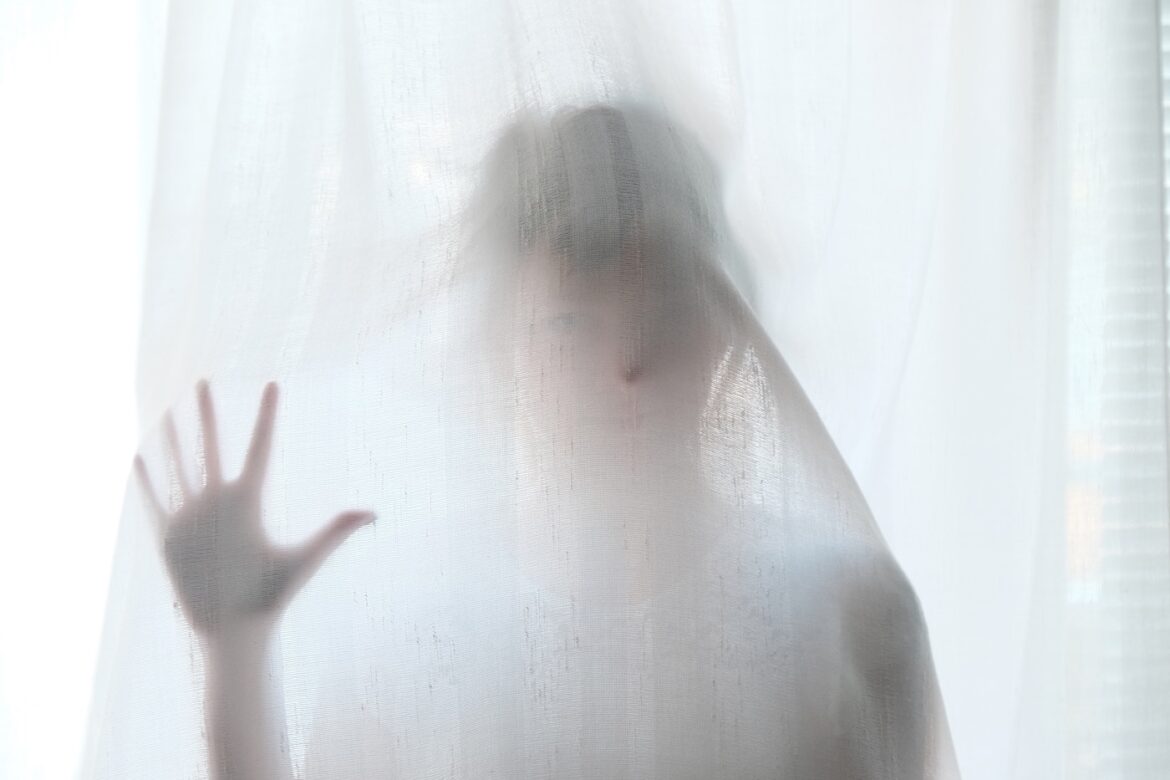An Essay by Caitlin Jiao Alexander
She will come to me as a ghost, which is unfortunate, but it is the only way. I will be compelled to glance up and I will see a woman who looks more like me than anyone else I know. She will stand a few yards away, wearing something simple, un-patterned. Her hair will be gray or black, her eyes will be dark and sad. Even if she were to smile (and most ghosts don’t smile), they will still be a little sad. She will have a narrow forehead with a smooth hairline, like mine, and full lips, like mine. If she speaks, she will say a name. I will not recognize her words as a name, but I will recognize her in the same way that one recognizes somebody in a dream: with feeling and certainty, not with logic. She will flicker like a dying lamp and then disappear.
***
When there’s so much you don’t know about yourself, fantasy blooms into your mind like weeds in an empty lot. Harmless, pretty, and just as susceptible to death as they are to growth. The stories, worlds, and characters constructed by young adoptees are called “the ghost kingdom” by Betty Jean Lifton, adoptee activist and psychologist. An adopted person’s imagination stretches to fill infinite unanswered questions. Who was my mother? What did she do? What about my father? What kind of life did they have? How do I fit into that lost legacy? The adoptee creates her own narratives. She uses half-redacted clues, or information passed from agency to adoptive parent, or pure speculation to populate her ghost kingdom.
As a child, my imagination would place me in the role of an alien, a descendant of royalty, even a clone. I was eleven years old, fantasizing about my figurative letter from Hogwarts, my superhero origin story. I read a children’s book series called Replica about a girl who begins to experience strange abilities, leading her to discover that she is a clone. She has a crescent-shaped birthmark on her shoulder; I have a splotch-shaped birthmark on my back. She was adopted but didn’t know; I am adopted and have always known.
“Isn’t it weird how I have that birthmark?” I asked my mom. “In the book I’m reading, the clone girl has a birthmark, too.”
“That doesn’t make you a clone, sweetie,” she responded in the loving yet dismissive way of a parent.
“It would be cool if I were, though,” I mumbled.
“No,” she said, “it wouldn’t.”
Why wasn’t it fun for her to imagine that I could be a cloned government experiment? It was fun for me. I didn’t want to be a sad, ordinary adopted person. I wanted to be special. I wanted a more interesting story than the one I was living.
Orphans and adoptees are tropes as old as storytelling itself: Moses, Superman, Annie, Harry Potter, Luke Skywalker, etc. Adoptees are living mysteries, quests-waiting-to-happen, puzzles with a heartbeat. The questions of our lives make for good backstory and motivation. The potential for lies and betrayal make for good plot twists. Our journeys from isolation to reunion make classic plots. But, of course, real life is not like the stories.
***
I get asked by both friends and strangers: “Do you want to find your birth parents?”
Their curiosity is bright as a spotlight, making me feel hot and exposed. They wonder if reunion would make me happier, if I want to find closure like in the stories.
Sometimes I want to say, “That’s actually very personal and none of your business.”
But I usually say, “I don’t know. It’s complicated.”
Growing up, the rare times I asked about my birth mother, I would get the answer: “She was poor, she was young, she loved you, but you were unfortunately born a girl.” Occasionally, my parents would read me the picture book When You Were Born in China. On the gold cover are two images in black-and white: the snaking spine of the Great Wall and a Chinese infant being embraced. Inside are more black-and-white pictures of China: people who all look like me, dirt streets, rows of bicycles, orphanages full of children. A white adoptive mother wrote this book as a comforting one-size-fits-all most-likely-scenario in 42 pages. It tells us that our mothers would have wanted to keep us, but the forces of culture and tradition and politics were against them. They wept at having to leave us, but it was for the best. We were cared for and adopted, after all. The book is compassionately written, yet it made my birth parents feel unnecessary. Why try to find them when that single story explained everything I needed to know?
The reality of being adopted from China during the early height of infant relinquishment is that I will probably never find my birth parents. There is a notorious lack of documentation from that era. Searching is also prohibitively expensive for me at this time: airfare, lodging, translators, investigators. Not to mention time off work. So I carry open-ended wondering through my life as though it were a part of me, a limb of loss. The fact that I don’t, and may never, know the people who brought me into this world is somehow both startling and mundane.
I admire adoptees who embark on birth searches, knowing that they can’t move forward without understanding the past. That if a foundation isn’t solid, the structure could collapse. But reunion, too, has its own complexities. You may discover that certain things can be healed by it while others cannot. It’s like choosing whether to undergo a surgery that would alleviate a lifelong ailment. Either way, the pain cannot be avoided. Either way, the scars are permanent.
In 2020, Netflix aired a documentary entitled Found that followed three young Chinese adoptees who discovered through DNA testing that they were biological cousins. With the support of their adoptive families, they journeyed to China for a birth search. They visited their hometowns and orphanages and spoke to Chinese parents who had relinquished children. However, they never located their own birth parents. Some viewers were disappointed that the movie did not deliver reunion and resolution, which is a narrative that many seem to expect from adoptees. One IMBD user wrote: “So the title is Found but the reality is that the three adopted girls have not found their biological parents…. I’m not sure I would have watched from the outset had I been provided with this information.”
These girls had genuinely tried, but failed, to find their birth parents in a country of more than a billion people. Don’t their stories have value, too?
***
It’s natural to wonder. When I look at other adoptees, I picture faraway clouds of family: people who resemble us, who outnumber us exponentially in the countries and communities where we were born. Shadows of absence lurk, not just around those who are adopted, but around the ones we left behind in the families where we originated. We are their ghosts and they are ours.
Is there someone in China who remembers the shape of my eyes or the birthmark on my back? How big is the space that I left behind? When I was growing in the body of a stranger, did she know that she would eventually have to say goodbye, or was she prepared to fight to keep me?
How did she end up losing that fight?
I choose to believe that her story matters, even if I may never know it.
I knew an adoptee from South America who had a single photograph of his birth mother. In it, he is a baby swaddled in a white blanket, being held by a woman who gazes down at him. A fringe of dark hair covers her eyes; the lower half of her face is blurry.
I knew a white couple who adopted a girl from Ethiopia. Before the adoption, the birth mother recorded a video for her daughter that the adoptive parents planned to show the girl when she was older.
Some adoptees have hospital documents or their original birth names; small windows into their pasts.
Many others have nothing. Nothing but ourselves, our bodies, as evidence that we were birthed by a stranger so foreign and distant.
But the power of blood is strong, as storytellers know, stronger than oceans and nations. It connects us in ways we neither fully understand nor perceive. The power of blood is there in the topography of my face, the shape of my body, and my mannerisms that cannot otherwise be explained. The physical, yes, but what about the spiritual?
My separation from my first family is functionally permanent. I know this. But perhaps separation is just a unique orientation. Distance does not sever all connections. I ponder the phrase to dig a hole to China. To know that the Earth is a vast, yet singular, organism on which we all stand. To stand, my bare feet on the dirt, and imagine electricity like synapses firing through rock and mineral, into another body. The body I came from. She feels nothing abnormal, maybe an itch. It happens and we continue our lives.
The fun thing about being adopted and knowing nothing is that you have all of fiction at your disposal. If you don’t know something, you can make it up. You are in control of your ghost kingdom. If someone else assumes the worst and you assume the best, or vice versa, nobody can be right. Nobody can be sure of the truth. My beliefs are my own and open to change and speculation. I let myself wonder: what if the spiritual energy of death could be so strong that I would feel it somehow? Could a spirit who senses our shared blood from thousands of miles away find me in her final moments?
I have never been religious, but this is always how I’ve imagined faith: the fictions we tell ourselves for lack of a better story.





